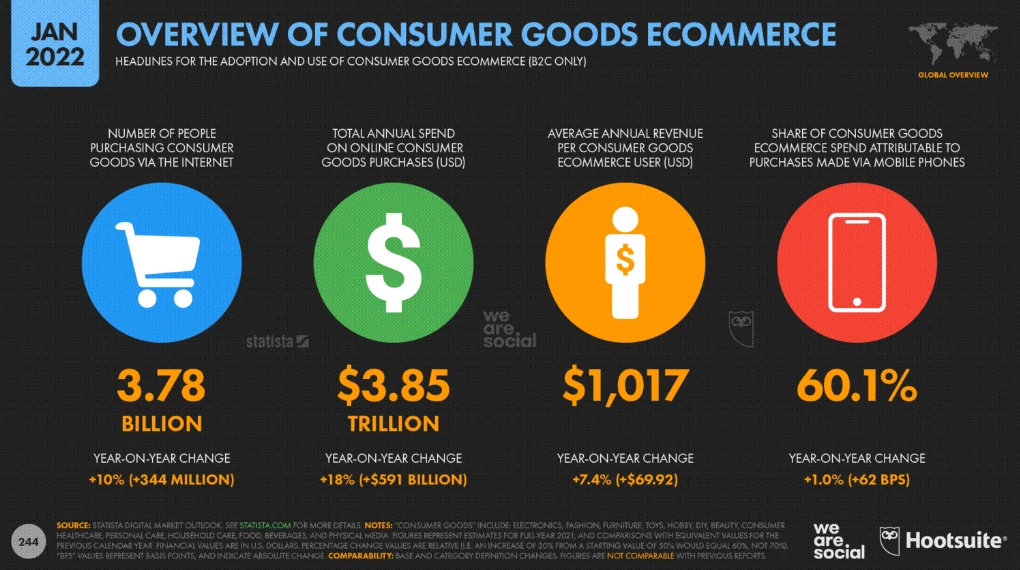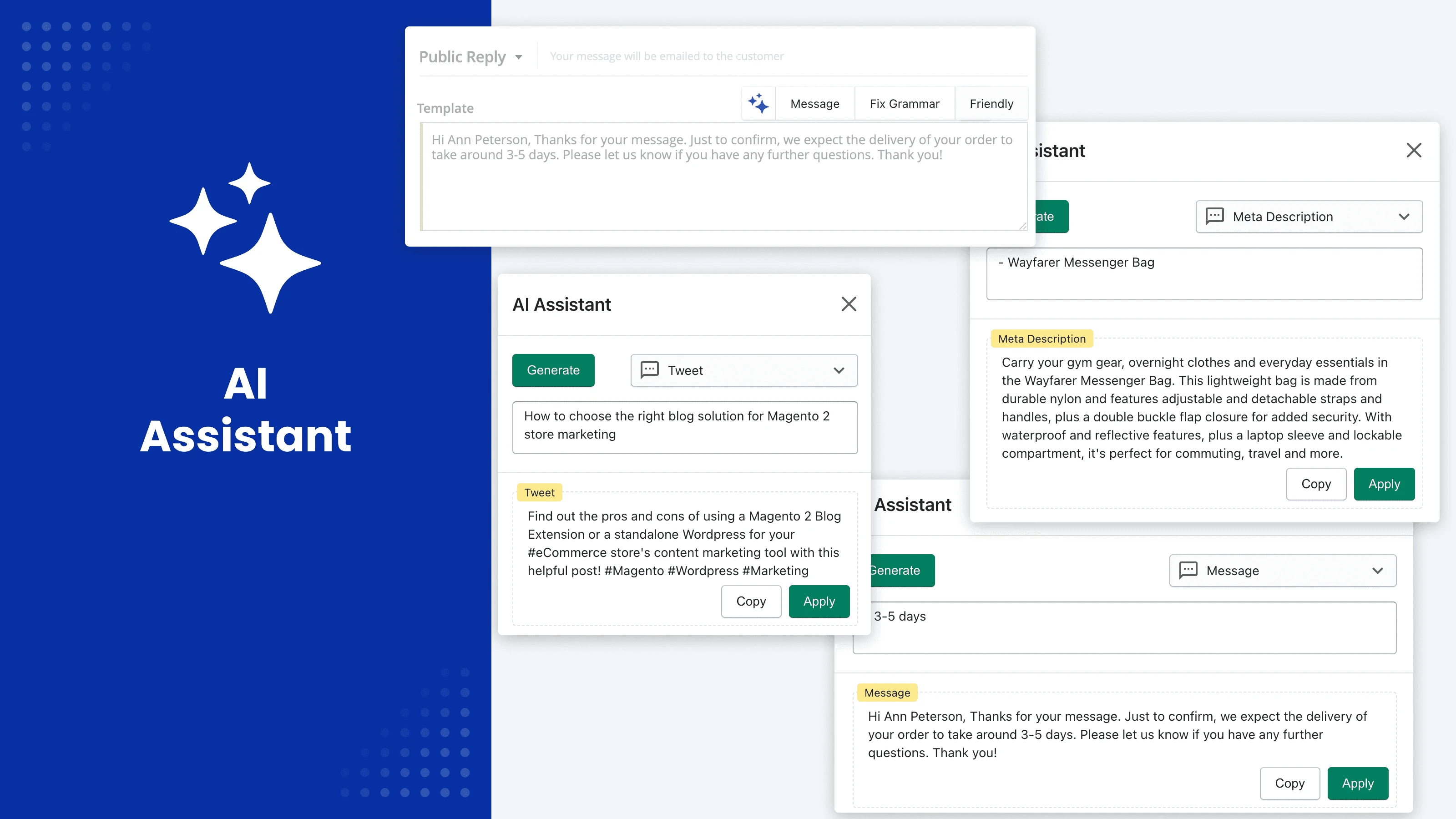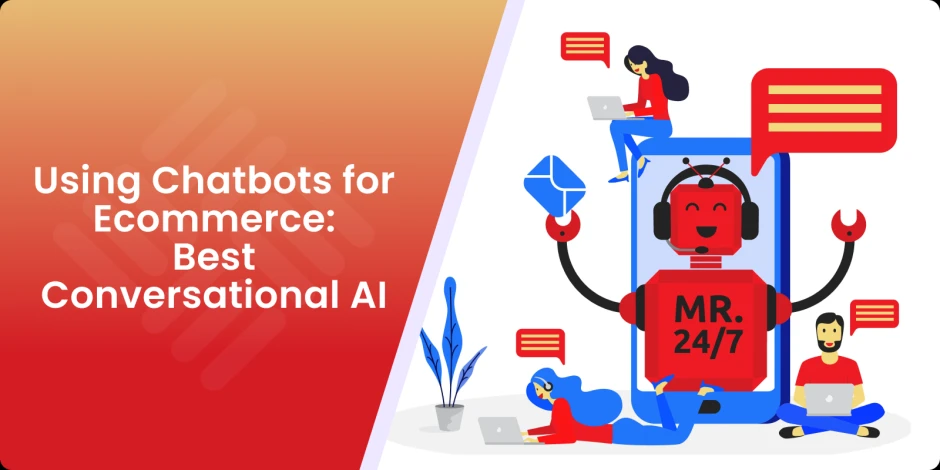Best Ecommerce Chatbots to Boost Your Online Business
-
 Anton Gurtovoi
Anton Gurtovoi
- e-Commerce Tips
- 11 min read
Recently, AI technology has skyrocketed in popularity. New neuro networks like ChatGPT have grasped users' attention with their accessibility and usefulness. This technology, in general, was created in the 60s but started to help businesses much later due to slow development speed. Simpler versions of these tools gained popularity in the 2010s in the form of AI chatbots for ecommerce. Robots-assistants in online shops that answer clients' questions about the products – one of the most popular uses of such bots.
Introduction to ecommerce chatbots
What is a chatbot for ecommerce?
Chatbots are programs that emulate a conversation with a real human being. They will answer questions, tell jokes, and react to the information given by the user. Advanced bots can pass as real people. However, these programs operate through a pattern of pre-determined triggers, conditions, and topics. Often, they have a set pool of information and rules they follow in conversations. This means that most chatbots currently have restrictions within their field of use.
For example, let's say that you visit an online car dealership with a shopping chatbot assistant installed. It will greet you with a chat bubble after you browse for a while and ask if you need help. Sometimes, the bot will answer your questions by directing you to specific FAQ chapters or call for a human assistant. More advanced bots can tell you the properties of the chosen car themselves if they have a database to reference. But they will not have anything to say about the clothes or food. It is simply not something they know about.
Types of chatbots
There are three types of e commerce chatbots. They are created for different tasks and have strong suits and weak spots. Chatbots differ in the way they are programmed:
- Rule-based. Simplest of the bunch, created for straightforward "question-answer" conversation. The best example is the social network chatbots that help to construct online orders. Such bots will ask about item size, color, and delivery address but will demand specific pre-determined answers, often giving a list of possible variants to the user. These bots are quick to set up and easy to manage but could be more versatile.
- AI-based. These chatbots can recognize speech patterns and understand full sentences. Instead of a pre-set list of questions and answers, they have a database that they address to search for requested information. AI chatbot for ecommerce can imitate human speech patterns and sometimes even remember users after the conversation. Helpers in online stores or smart assistants like Siri are prime examples of these bots. They are more comfortable interacting with and possess a high level of versatility but generally are more demanding of resources.
- Hybrid. A mix of rule-based and AI-based bots that often operate through straightforward conversations but also give advice. For example, lest return to the social network ecommerce chat bot that forms your order. The hybrid type can also advise which item size suits you, given your complexion. This type of e commerce bot balances the usage versatility and setting up difficulty.
The importance of chatbots
Statistics claim that customers in the post-pandemic world have very short patience. Most visitors will abandon the website in seconds if their query is unanswered. Some websites have thousands of clients daily, and many users can contact assistants simultaneously. To satisfy everyone, you must hire a lot of additional human force.

Chatbots may help you solve both dilemmas at the same time. They will take orders, answer questions, and deliver information to multiple visitors at once. Anxious customers can also avoid contacting humans via phone or email by talking to a chatbot. It will work every day for 24 hours and will never get tired or need a vacation. And that is only the tip of the usefulness iceberg.
Ecommerce bots abilities
Despite their type differences, all chatbots possess many useful abilities for any online business. Even the simplest rule-based bots allow you to improve client experience, automate certain processes, and increase conversion rate. Here are some things that bots can do for you.
Selling
Rule-based ecommerce chatbot can serve as a salesperson. The owner needs many staff members when a business is spread across multiple social networks and its own website. Someone must answer personal messages on Facebook or Instagram to direct a sale. This job can be easily allocated to the rule-based ecommerce bot. It will collect all the necessary data about the order without human help. Hybrid chatbots can also upsell to a customer, proposing to buy other items based on the cart’s contents. For example, advise to purchase a blue shirt together with blue jeans.
Assisting
Smart ecommerce AI chatbot can be an assistant to the customers. Using an uploaded database, the chatbot can answer different product questions. For example, check the availability, recommend popular items, check for running discounts, or tell facts about the brand. The erudition of the bot depends on its complexity and the information developers give it. Some bots may even check the weather for customers or entertain them by telling jokes. This conversational AI for ecommerce can bring life to a static online store. A sense of presence is often comforting and reassuring, which is important for building user trust.
Promoting
Any e commerce chatbot can promote certain items to customers. Simpler bots may be wired to send advertisements through email, private messages, or during order construction. More advanced ones can advise customers to buy certain items based on their cart content or purchase history. Some AIs may also recommend specific brands in conversations.
Retaining
Customer retention is fundamental for a store’s success. Visitors new to the shop sometimes leave devoided of capturing interactions or without finding anything interesting. The chatbot can help to retain such potential clients. Observe the statistics and discover the average time users spend on the website before leaving. Then, make the chatbot contact the visitor when that time is approaching. This way, you can capture the user's attention and possibly make a sale.
Gathering feedback
The chatbot for ecommerce website can also collect valuable information about users. Bots may ask clients for a review or rating, emails, shipping details, and other data bits. Some chatbots also report on the length of conversations and frequently asked questions. Gathered data can fill in your database and help you to discover more about customers’ preferences.
Informing
Chatbots are great at offering users additional information. For example, they can ask for an email address to send updates about the order or upcoming discounts. The chatbot can offer visitors trivia about the company, products, or other relevant subjects. These interactions help to keep customers engaged with your commerce and feel supported, which is good for building trust.
Fields of usage: where do robots work?
The best chatbots for ecommerce have many abilities, but where are they used? Modern chatbots are flexible and find usage on quite a few different platforms. Generally speaking, their fields of use can be divided into three categories:
- Web chats. Live chat on your website may help you to increase your conversion rate. Statistics say that many modern customers prefer chatting over emails or phone calls. An AI chatbot can fill in that role and assist your clients in making purchases.
- Social networks. The social media market is ever-growing and adding digits to its user count. Many small and big businesses are trying to conquer Facebook or Instagram, and chatbots are helping. They can contact users to help them form the orders and send them information or promotional material. Rule-based and hybrid bots are most popular in this field.
- Messengers. Apps like Snapchat or Telegram are used by millions of users daily. Some don't have time or wish to shop at the website, but they can still be your clients. You only need to set up a chatbot for e commerce messenger account. It will handle the order construction, deliver info about discounts and new additions to the inventory, and subsequently bring you more revenue.
The best among popular chatbots
Nowadays, the chatbot market is thriving and presenting business owners with many products. Some have already proved their worth and gained renown according to their abilities and user comfort. Here are six of the best chatbots among the popular ones in a nutshell.
Tidio
This chatbot has flexible payment plans, a limited-use free version, and is open to small and medium commerce. It provides live chat functionality for many website-building platforms, like Magento and Shopify. Tidio also allows to set up bots for Facebook, Instagram, and Snapchat. You can customize conversational templates and add surveys to collect users’ feedback.
ManyChat
The platform offers to manage your social media accounts, live chats, email, and SMS. It features a simple drag-and-drop chatbot builder and a few pre-built templates. The bot is connected to a Dialogflow algorithm by Google and supports many popular languages. However, custom coding is less flexible with this one.
Drift
The Drift offers both AI and rule-based chatbots for any business purpose. It allows you to add widgets to the chat window for unique interactions. These bots can switch between topics in the conversation and interpret open-ended queries. Pricing and pay plans, however, are not so flexible and affordable for small businesses.
ChatGPT
A well-known AI that appears in many articles and posts may help your website. Some modules provide support for this conversational AI. It can become a live assistant for your users, answer their questions, and help them to complete their orders. You just need to upload the information about your products so the bot may learn it. Developers constantly improve this bot and its algorithm to be flexible and human-like in conversations.
HubSpot
This CRM toolbox includes smart chatbots for websites. HubSpot allows you to build your own bot via a simple builder that doesn't require any programming knowledge. The design of the live chat is modifiable and enables you to match it with your website’s aesthetic. Bots are available for free but limited in functions without a proper paid plan.
Chatfuel
Sometimes, the best option is the simple one. Chatfuel is a living representation of this phrase – it provides you with simple, robust tools to automate messenger management. The platform offers live chat, but the target usage is in the messengers and social networks. Chatfuel doesn't have many advanced functions. However, bot-building takes minutes and doesn't require coding skills. This chatbot may also be used free of charge, but only for up to 50 users.
Tips for the best use of chatbots in ecommerce
However useful e commerce bots are, you should use certain tips to make the most out of them. Chatbots are a powerful tool that should be used with wisdom. Here are four pieces of advice on maximizing your profit from conversational AI in ecommerce.
Pick the right bot for the job
AI is superior to other types of bots and can seem like the best chatbot for ecommerce. Rule-based programs are indeed less intricate than ChatGPT, for example. However, it doesn't mean that you must always use only AIs. Rule-based or hybrid chatbots can easily handle simpler jobs like information distribution or forming orders. Software, in their regard, may also be overqualified and misused. AI can reach its full potential as an assistant rather than a simple cashier.
Let humans help robots
Letting humans and robots work together and oversee each other is always a good idea. Human mistakes, as well as chatbot ecommerce mishaps, can happen to everyone. To eliminate any risks, you should always leave at least one human employee to oversee the processes of the chatbots. However advanced, they are still incapable of human-like analyses and thoughts.
Don’t overdo it
As tempting as it can be, you shouldn't use chatbots at every corner of your business. If a chatbot is bothering your customers every five minutes on each store page – they will probably leave early without any purchases. The same goes for troubleshooting. A conversational chatbot for ecommerce can confidently help customers with most troubles. However, rare errors or specific questions still require the attention of a human worker.
Keep your hand on the pulse
It is always a good idea to ask users for reviews and contact information through a chatbot. Some clients can be unaware that you require feedback, and the personal information can go into your client database. Statistics about held conversations can also tell you much about your user base. For example, what troubles do visitors encounter the most? This information is always worth keeping track of.
Magento modules with ecommerce chat bots
Chatbots ecommerce value is not easy to underestimate. However, not everyone can write such bots, and custom orders for them can be expensive. This is where Magento chatbot commerce modules are coming in. They can provide fully operational bots for your online store no programming required. You just install the module and go through comprehensible settings: write a "hello message", add tags, upload data, etc. Then, you switch the chatbot on.

For example, Mirasvit offers a conversational AI ecommerce assistant based on ChatGPT. It can imitate real conversations based on the documents you may upload about your products, company, and troubleshooting. The program can hold conversations in different languages, improve itself based on users’ feedback, and be online 24\7 to help any visitor. You also have full access to the conversation history of the chatbot to assess its effectiveness and gather useful information.
Conclusion: Position of chatbots in ecommerce
The conversational bots ecommerce usage is a powerful tool that can help any business to grow. Chatbots can reduce the workload on human employees, work without rest, and provide more comfort to customers. Not to mention that many users find them more likable than emails and phone calls. The bots may be assistants, cashiers, and promoters. As statistics show, if used with wisdom, they can easily boost your revenue by up to 20%. The best way to implement them is to use Magento modules. They are quick to set up, don't require programming skills, and offer all the benefits of conversational AI.
Beyond customer-facing chatbots, AI can also streamline your back-office operations. AI CoPilot for Magento 2 brings an AI-powered assistant directly into the Magento admin panel, allowing your team to query orders, products, and customer data through natural conversation.




